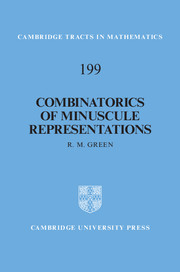Book contents
- Frontmatter
- Contents
- Introduction
- 1 Classical Lie algebras and Weyl groups
- 2 Heaps over graphs
- 3 Weyl group actions
- 4 Lie theory
- 5 Minuscule representations
- 6 Full heaps over affine Dynkin diagrams
- 7 Chevalley bases
- 8 Combinatorics of Weyl groups
- 9 The 28 bitangents
- 10 Exceptional structures
- 11 Further topics
- Appendix A Posets, graphs and categories
- Appendix B Lie theoretic data
- References
- Index
6 - Full heaps over affine Dynkin diagrams
Published online by Cambridge University Press: 05 February 2013
- Frontmatter
- Contents
- Introduction
- 1 Classical Lie algebras and Weyl groups
- 2 Heaps over graphs
- 3 Weyl group actions
- 4 Lie theory
- 5 Minuscule representations
- 6 Full heaps over affine Dynkin diagrams
- 7 Chevalley bases
- 8 Combinatorics of Weyl groups
- 9 The 28 bitangents
- 10 Exceptional structures
- 11 Further topics
- Appendix A Posets, graphs and categories
- Appendix B Lie theoretic data
- References
- Index
Summary
It will turn out that the correspondence of Theorem 5.5.6 extends to a bijection between the isomorphism types of full heaps over untwisted affine Dynkin diagrams and the isomorphism classes of minuscule modules; the latter were classified in Theorem 5.1.5.
In order to do this we need to construct a corresponding full heap for each minuscule representation of a simple Lie algebra. Most of Chapter 6 is devoted to constructing the necessary heaps. We first deal with the difficult (nonranked) case of type A in Section 6.1, and classify the relevant full heaps in Theorem 6.1.18. The related problem of classifying the proper ideals in type A is considered in Section 6.2. The full heaps corresponding to the spin representations in type D are constructed in Section 6.3, and in turn this enables the constructions in types B and twisted D in Section 6.4. The three exceptional full heaps are constructed in Section 6.5.
The main result of Chapter 6 is Theorem 6.6.2, which classifies all full heaps over affine Dynkin diagrams. (There are other examples of full heaps, some of which are described in Section 6.1.) In addition to giving a construction of all minuscule representations, this theorem has a number of other interesting corollaries, such as a description of all the lowest weights of minuscule representations in Proposition 6.6.8. Many of the constructions in this chapter will be of key importance when studying particular examples later on.
- Type
- Chapter
- Information
- Combinatorics of Minuscule Representations , pp. 118 - 147Publisher: Cambridge University PressPrint publication year: 2013



